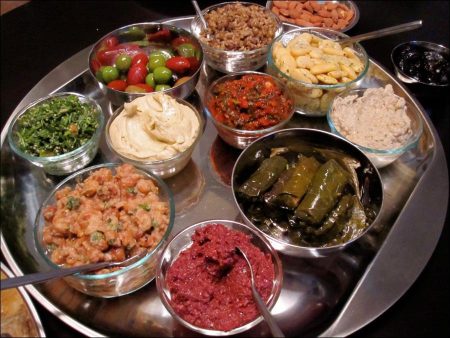Turkish cuisine is a combination of Middle Eastern food (kebabs, pitta bread and houmous) and Mediterranean food, (tomatoes, garlic, grilled meat, and olive oil). Hot peppers, herbs (cumin, mint, parsley, dill) and yoghurt are important ingredients in Turkish cuisine. Bread is part of the Turkish daily diet.
A “meze” consisting of a number of small dishes may be served before the main course of a meal. These include slices of melon, feta cheese, pickles, nuts and small portions of vegetables, fish, and salads.
Soups (fish, rice, lentil), rice and wheat dishes (pilaf), meats (lamb, mutton, veal, poultry) and seafood (anchovies, sardines, mackerel, octopus, mussels) are prepared with vegetables (aubergines, artichokes, chick peas, beans, beetroot, chard, cucumbers, mushrooms, onions, peppers, spinach, tomatoes). Stuffed vegetables (sarma and dolma), egg dishes and meatballs are popular. The kebab, marinated lamb roasted on a spit, is a Turkish favourite.
Milk puddings flavoured with orange, lemon or rose water are a popular dessert. Other desserts include fresh and stewed fruit (apples, apricots, cherries, figs, melons, peaches, pears, plums, quince, strawberries and tangerines), pastries and sweets such as Turkish Delight and halva.
Raki, an anise flavoured spirit, is the national drink. “Boza”, another traditional alcoholic drink is made from fermented wheat berries. Beer, wines and fruit juices are produced. “Turkish” coffee is thick and black and tea is prepared over boiling water and served in small glasses.
Views: 157



